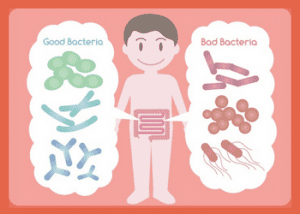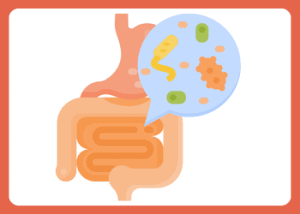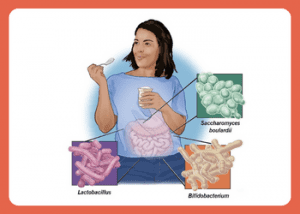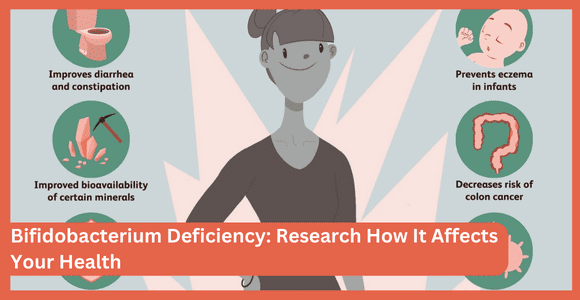Your body contains trillions of bacteria, which are crucial for your well-being– one vital type being Bifidobacteria. These advantageous organisms break down dietary fiber, protect against infection and generate vitamins and other essential compounds.
Research has uncovered a direct correlation between an insufficient amount of Bifidobacteria and several diseases. Luckily, it is possible to counterbalance these levels with supplements that can alleviate the conditions’ symptoms. To gain greater insight into this probiotic type’s significance for your health, read on – discover what makes Bifidobacteria so beneficial.
Table of Contents
What Are Bifidobacteria?
 Bifidobacteria are Gram-positive, anaerobic bacteria that exist naturally in the digestive tract of humans and other living beings. They constitute a subdivision within Actinobacteria and stand out thanks to their Y-shape as well as their talent for fermenting carbohydrates such as dietary fiber.
Bifidobacteria are Gram-positive, anaerobic bacteria that exist naturally in the digestive tract of humans and other living beings. They constitute a subdivision within Actinobacteria and stand out thanks to their Y-shape as well as their talent for fermenting carbohydrates such as dietary fiber.
Bifidobacteria is an essential element of the microbiome in our digestive tracts and has numerous positive implications for our well-being. Beneficial metabolites like short-chain fatty acids, vitamins, and antimicrobial peptides are created by this bacteria which can contribute to improvements in gut health; offsetting a variety of illnesses while bolstering your immunity system.
Did you know that there are more than thirty subspecies of bifidobacteria? Bifidobacterium bifidum, B. lactis, and B. longum have been extensively investigated, making them the most commonly used in probiotic medicine.
These microbes can be found naturally occurring in certain foods like fermented dairy products or they may be taken as supplements to aid restore balance to a person’s gut microbiome.
What Foods are High in Bifidobacterium?
Here are some examples of foods that are high in bifidobacterium:
- Fermented dairy products, such as yogurt, kefir, and buttermilk
- Fermented vegetables, such as sauerkraut, kimchi, and pickles
- Fermented soy products, such as tempeh and miso
- Fermented grains, such as sourdough bread
- Fermented beverages, such as kombucha and kvass
It’s worth noting that the amount and type of bifidobacteria in these foods may vary depending on the specific product and how it was prepared. Additionally, not all fermented foods contain live bifidobacteria, as some products are pasteurized or treated with heat, which can kill off the beneficial bacteria. Choosing products that are labeled as containing live and active cultures may help ensure a higher content of bifidobacteria.
How to Increase Bifidobacteria in Your Gut
Fostering a healthy gut microbiome can be accomplished by supplementing your diet with probiotic-rich foods such as yogurt and kefir, along with high fiber content and prebiotics. This combination will help to increase the levels of bifidobacteria found in the body.
 If you’re looking to boost bifidobacteria levels in your gut, here are some simple ways to do so:
If you’re looking to boost bifidobacteria levels in your gut, here are some simple ways to do so:
- Eat a diet high in fiber: Consuming a variety of fiber-rich foods, such as fruits and vegetables, whole grains, and legumes can help nurture the growth of beneficial bifidobacteria in your gut.
- Consume probiotic-rich foods: Probiotic-rich foods, such as yogurt, kefir, kimchi, and sauerkraut, contain live bifidobacteria and other beneficial bacteria that can help improve gut health.
- Take bifidobacteria supplements: The supplements are widely available and can be taken in capsule or powder form to help restore the balance of gut microbiota.
- Avoid excessive use of antibiotics: When it comes to antibiotics, if you want to protect the balance of your gut microbiome and bifidobacteria specifically, it is essential that you use these medications only when absolutely necessary and with precise instructions from a certified healthcare provider.
- Manage stress: Prolonged stress can drastically affect gut health, diminishing the number of beneficial bacteria such as bifidobacteria. To combat this, it is recommended to incorporate relaxation practices into your daily routine; activities like meditation, yoga, or deep breathing exercises may help foster a flourishing microbiome.
Benefits. How Does Bifidobacterium Help Your Body?
Here are some of the potential benefits :
- May help improve digestion and alleviate symptoms of gastrointestinal conditions, such as irritable bowel syndrome and inflammatory bowel disease
- Supplementing your diet may help to strengthen your immune system and protect you against respiratory infections, diarrhea, and other illnesses.
- Evidence suggests that this may alleviate the inflammation and oxidative stress associated with various chronic illnesses such as cancer and cardiovascular disease.
- May help improve cognitive function and mood, possibly by modulating the gut-brain axis
- Utilizing this product may potentially reduce the intensity and frequency of allergies and even eczema in babies, toddlers, or young children.
- Boosting gut barrier performance and lowering intestinal permeability, may block the passage of harmful materials into your blood.
- May help improve nutrient absorption and utilization, particularly of vitamins and minerals.
- It is pivotal to realize that further research must be conducted in order to comprehend the potential advantages of bifidobacterium and how it interacts with the body.
- The perfect dosage and timeframe for treatment may also differ depending on each individual’s health condition as well as their unique needs.
 Numerous diseases have been linked to a deficiency of Bifidobacteria in the gut. Research suggests that those with ailments such as celiac disease, obesity, diabetes, allergic asthma, and dermatitis display lower levels of these beneficial bacteria than what is considered healthy.
Numerous diseases have been linked to a deficiency of Bifidobacteria in the gut. Research suggests that those with ailments such as celiac disease, obesity, diabetes, allergic asthma, and dermatitis display lower levels of these beneficial bacteria than what is considered healthy.
Consequently, a variety of research has been done to analyze how consuming Bifidobacteria in the form of probiotic supplements can increase their population within the intestines and alleviate symptoms related to illnesses. It’s even possible that particular species may help decrease signs linked with irritable bowel syndromes (IBS), such as gassiness, cramps, and abdominal pain.
Comprehensive research involving 362 individuals revealed that taking a Bifidobacteria probiotic for four weeks considerably improved symptoms of IBS.
Not only has Bifidobacteria probiotic been found to reduce inflammation in those suffering from inflammatory bowel disease, ulcerative colitis, chronic fatigue syndrome, and psoriasis; but it may also be an instrumental marker for improved health. Evidence suggests that a 45-day outpatient program involving the strain of bacteria resulted in lower BMI and cholesterol levels among people with metabolic syndrome. Therefore, taking on this probiotic could prove beneficial for overall well-being.
Research has discovered positive effects on cholesterol levels. Astonishingly, it may even be beneficial for brain health. Two studies demonstrated that when paired with other probiotics, Bifidobacteria decreased psychological distress and thoughts related to sadness in healthy individuals. Moreover, one study recently revealed that these same probiotic bacteria might also aid people suffering from depression.
Side Effects. What Disease Does Bifidobacterium Cause?
Bifidobacterium typically has a low risk of adverse effects and is usually well-tolerated. However, in isolated cases, it may lead to the following side effects.:
- Allergic reactions, such as rash, hives, or swelling
- Infections, particularly in individuals with weakened immune systems
- Gas and bloating, which may occur due to the fermentation of carbohydrates by bifidobacteria in the gut
All in all, employing bifidobacterium does not normally lead to any particular illness or health condition. However, those with existing medical ailments or taking medicines should contact their healthcare provider prior to consuming bifidobacteria supplements to guarantee safety and efficacy.
Frequently Asked Questions
What Would Happen if We Didn’t Have Bifidobacterium?
Ingesting too much of certain bacteria can lead to digestive issues such as stomach cramps, diarrhea, and bloating. Further, an unbalanced microbiome could possibly result in prolonged low-grade inflammation inside the gut that has been linked with a multitude of illnesses outside the gastrointestinal tract.
How Do I Get More Bifidobacterium?
In addition to ingesting probiotics that facilitate the growth of advantageous bacteria in our digestive system, we can further promote a healthy gut by consuming prebiotics such as ITFs and AXOS’, thereby increasing the presence of bifidobacteria within our colon.
Where is Bifidobacterium Found?
Bifidobacterium is a popular probiotic bacterium found in the gut microbiome. It can also be consumed through dairy products and fermented foods, aiding digestion while providing other health benefits such as improved digestion and immune system support.
What is Bifidobacterium Treatment?
Bifidobacterium therapy utilizes bifidobacteria-based probiotics to reestablish a healthy balance of gut flora. It has been investigated for its potential benefits in healing different gastrointestinal ailments, such as irritable bowel syndrome and inflammatory bowel disease, while also improving immune capacity and reducing the danger of certain infections.
Conclusion
All in all, an absence of bifidobacteria can have a detrimental effect on your health. Studies suggest that having insufficient amounts of these bacteria may be linked to various digestive issues, such as irritable bowel syndrome and inflammatory bowel disease. Moreover, not enough bifidobacteria could raise the risk for obesity, type 2 diabetes, and other chronic illnesses.
Lucky for us, there are many approaches we can take to support the growth of bifidobacteria in the gut. We could create a diet enriched with fiber or introduce probiotic-rich foods into our regimen. Additionally, taking supplements that contain these bacteria and limiting the use of antibiotics may prove effective as well.
Although further research is necessary to comprehend how they affect human wellness and develop specialized interventions that optimize microbiota balance, incorporating these strategies now will undoubtedly benefit your long-term health.
